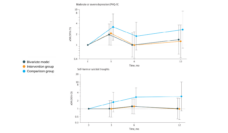LGBTQ+ youth endure more bullying, harassment, and violence than their peers. Over two-thirds of self-reported trans and gender diverse youth come from homes that do not affirm their gender, and nearly one in five attempted suicide this past year, according to a Trevor Project survey. Given the sharp rise of anti-trans legislation, spaces where queer youth feel welcome can be life-saving. Now more than ever, school support for these students is crucial.
Katherine Parodi and colleagues explored the mental health of self-reported trans and gender diverse students aged 14 to 18 across the U.S. by asking these teens how they felt about their school environments. They found that queer kids reported less anxiety when they felt more connected to their school, and when the school instituted nondiscrimination policies and gender-sexuality alliance programs.
Above, the figure on the left illustrates lower anxiety with increased school connectedness among students who reported any of four trans and gender-diverse identities. Anxiety scores were lowest for nonbinary-identifying students who had been assigned male at birth (AMAB, in the graph). In the figure on the right, affinity programs like gay-straight or gender-sexuality alliances lowered anxiety for only some students. Nonbinary students assigned female at birth (AFAB) and transgender males reported less anxiety, but nonbinary students assigned male at birth and transgender female students did not. School affinity groups do not seem to be universally helpful.
The researchers suggest a tiered support system to improve LGBTQ+ student anxiety: inclusive resources and services for all, with more options available for those with more complicated mental health concerns. This would mean robust training for staff, an expense that would need to be borne by school systems looking to create the best learning environments for this student group.
This heavier onus on schools is essential for providing safe spaces that will support queer students as much as they need and deserve.
Databyte via Katherine B. Parodi, Melissa K. Holt, Jennifer Greif Green, et al. Associations between school-related factors and mental health among transgender and gender diverse youth. Journal of School Psychology, 2022.














